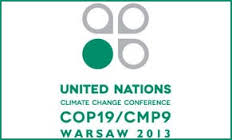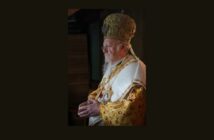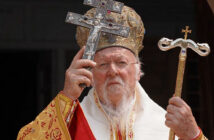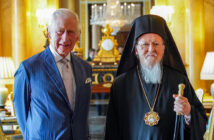 Source: Greek Orthodox Archdiocese of America
Source: Greek Orthodox Archdiocese of America
The International Environmental 19th Conference of the Parties (COP 19) opened in Warsaw on November 11 and will conclude on November 22, 2013.
His All Holiness Ecumenical Patriarch Bartholomew has addressed a statement on the importance and implications of this convention.
MESSAGE
By His All-Holiness Ecumenical Patriarch Bartholomew
To the 19th Session of the Conference of the Parties (COP 19)
Warsaw, November 2013
When will we choose to live more simply?
This week – even as the world mourns the tragic loss of life in the unprecedented Typhoon Haiyan in the Philippine Islands – political leaders have converged on Warsaw, Poland, in yet another anticipated meeting on climate change. Concerned citizens throughout the world are hoping and praying for prompt and practical results.
The conference follows on the heels of an important report by the Intergovernmental Panel on Climate Change (IPCC), which warns of the urgency of immediately addressing the alarming escalation of climate change in order to avoid catastrophic consequences.
Scientists talk of “tipping points” and “abrupt climate change.” Political leaders talk of the “challenges” that lie ahead. Scripture speaks of human crisis and God’s forgiving grace. All three make it clear that the time will come when we must face consequences; the time will come when it is simply too late.
At first glance, it may appear strange for the leader of a religious institution concerned with “sacred” values to be so profoundly involved in “worldly” issues. After all, what does preserving the planet have to do with saving the soul? It is commonly assumed that global climate change and the exploitation of our nature’s resources are matters that primarily concern politicians, scientists and technocrats. At best, perhaps they are considered the preoccupation of interest groups, naturalists or activists.
Nevertheless, there are no two ways of looking at either the world or God. There is no distinction between concern for human welfare and concern for ecological preservation. The way we relate to nature as creation directly reflects the way we believe in God as Creator of all things. The sensitivity with which we handle the natural environment clearly mirrors the sacredness that we reserve for the divine.
Moreover, scientists estimate that those most hurt by global warming in the years to come, are those who can least afford it. According to the Gospel of St. Matthew, the questions that will be asked of us all at the final moment of accountability will not be about our religious observance but on whether we fed the hungry, gave drink to the thirsty, clothed the naked, comforted the sick, and cared for captives.
Our reckless consumption of the earth’s resources – energy, water, and forests – threatens us with irreversible climate change. Burning more fuel than we need in an overpopulated city, we may contribute to droughts or floods thousands of miles away.
To restore the planet we need a spiritual worldview, which brings frugality and simplicity, humility and respect. We must constantly be aware of the impact of our actions on all of creation. We must direct our focus away from what we want to what the planet needs. We must choose to care for creation; otherwise, we do not really care about anything at all.
In our efforts, to contain global warming, we are ultimately admitting just how prepared we are to sacrifice some of our selfish and greedy lifestyles. When will we learn to say: “Enough!”? When will we understand how important it is to leave as light a footprint as possible on this planet for the sake of future generations?
After all, we are all in this together. Our planet unites us in a unique way. While we may differ in our conception of the origins or purpose of our world, and while we may disagree on social or political ideology, surely we can all agree on our responsibility and obligation to protect its natural resources – which are neither limitless nor negotiable – for future generations.
It is not too late to respond – as a people and as a planet. We could steer the earth toward our children’s future. Yet we can no longer afford to wait; we can no longer afford to be idle. The world has clearly expressed its opinion; our political leaders must accordingly act with urgency. Deadlines can no longer be postponed; indecision and inaction are not options. We have a choice to make. The time to choose is now.
We remain optimistic about the results at Warsaw; quite simply because we are optimistic about humanity’s potential. Let us work together; let us offer the earth an opportunity to heal and continue to nurture us.
_____________________________
Biographical Note: His All-Holiness Ecumenical Patriarch Bartholomew, spiritual leader of the world’s 300 million Orthodox Christians, is 270th successor of St. Andrew the Apostle, who founded the 2000-year-old church of Constantinople. He has worked for reconciliation among Christian Churches and religious understanding among the faith communities. His efforts to promote human rights and religious tolerance, together with his pioneering work for international peace and environmental protection, have placed him at the forefront of global visionaries, earning him the title “Green Patriarch.” He was named by Time magazine as one of the world’s 100 most influential people and honored with the US Congressional Gold Medal. He has authored Encountering the Mystery (Doubleday); his ecological statements appear in On Earth as in Heaven (Fordham).
[subscribe2]


